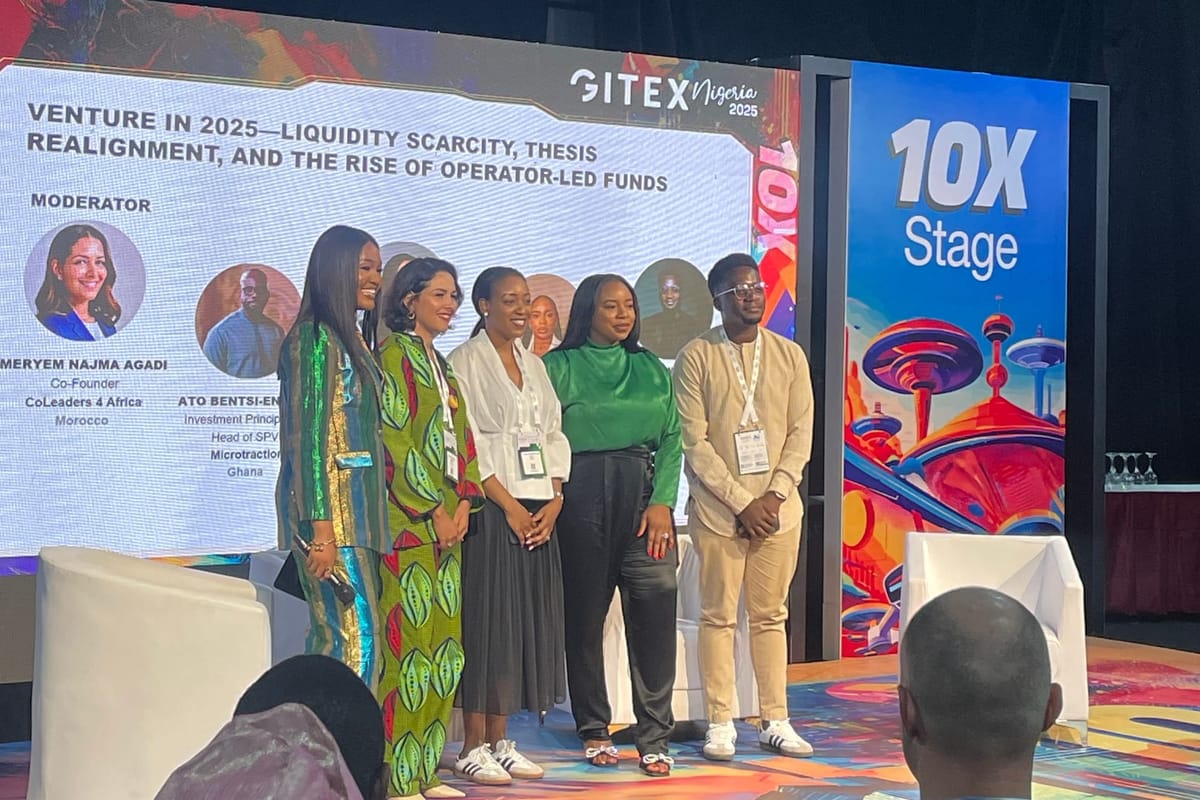The Gulf Information Technology Exhibition (GITEX) 2025 has been running all week, but on Wednesday, September 3rd, the focus shifted to the Tech Expo at Eko Hotel in Lagos.
Here, the spotlight fell firmly on cybersecurity and enterprise ICT solutions with the venue buzzing with innovation as global giants and smaller multinationals filled the hall, eager to showcase solutions tailored for Africa’s fast-growing tech ecosystem.
From AMD to NVIDIA, some of the world’s biggest players in ICT technology came under one roof, giving businesses and policymakers direct access to enterprise-grade solutions that are capable of driving national and regional transformation.
Being on the ground on Days 1 and 2 of the Tech Expo made all the difference. It meant walking through the booths, seeing the technologies firsthand, and having real conversations with company representatives.
The energy on the floor was unmistakable, a reminder that Africa’s digital future is being built not in theory, but in real time.
Nigeria’s ICT Minister Calls for a United AI Strategy at GITEX 2025
Forging public-private partnerships, policies, robust infrastrucutre and nurturing local talent were all identified as urgent steps to ensure the continent does not miss the opportunities of the AI revolution.
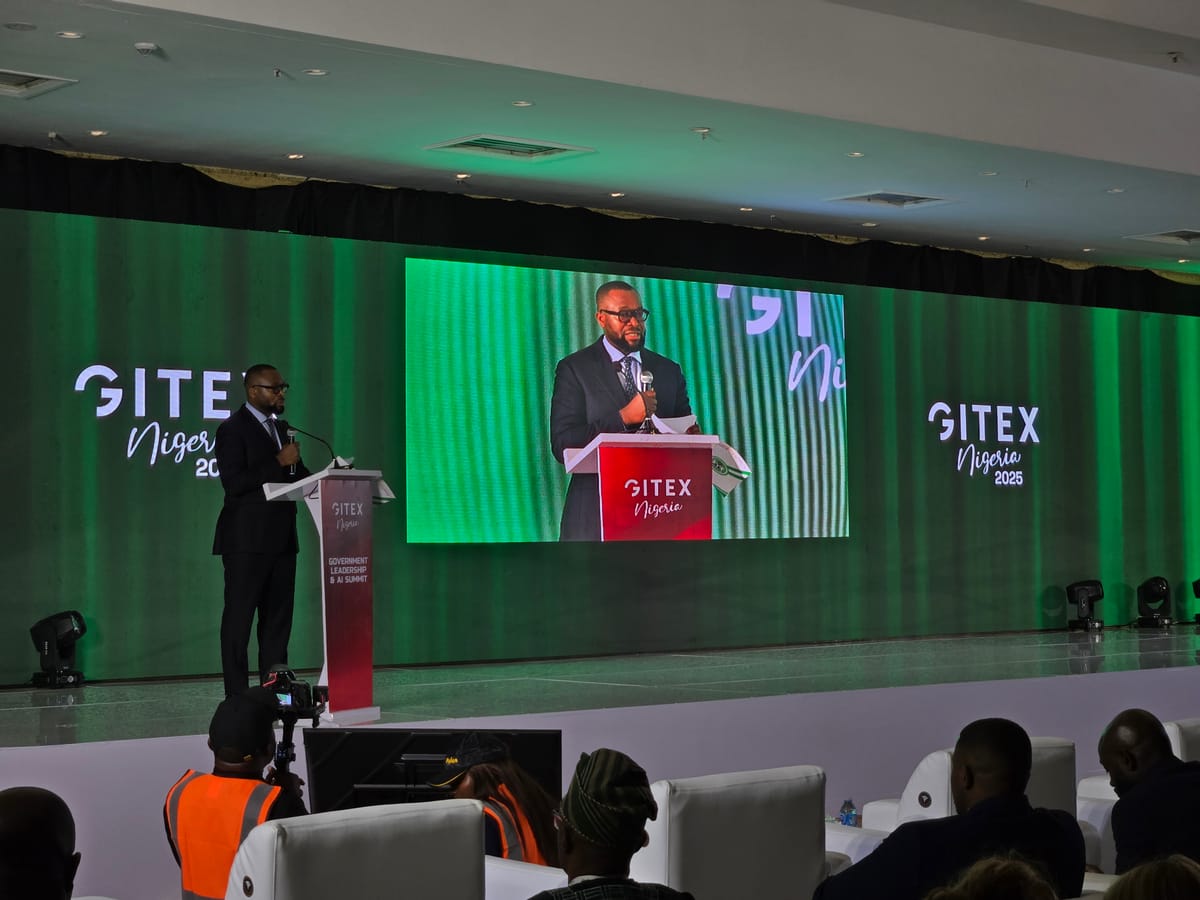
Cybersecurity and ICT Solution Providers Took the Spotlight
Several companies’ Booths at the GITEX 2025 Tech Expo Day 1 | Video Credit: Oluwaseun Bamisile/Techloy.com
One thing that stood out clearly was the dominance of cybersecurity and enterprise ICT solution providers at the expo. Dozens of booths from different companies focused on data protection, identity management, and enterprise IT infrastructure, a sign of where Africa’s tech priorities are heading.
In one of the booths, Sechpoint, a Dubai-based cybersecurity distributor, featured cybersecurity partners like Seclore, PingIdentity, Kron, Securiti, Forescout, Threatlocker, and SailPoint, each targeting different layers of enterprise security.
At the Seclore section, a representative explained how the company focuses on encrypting and storing information for organizations, classifying that data, and providing enterprises with complete control over access.
In his words, “No matter where you are or your location, the information is always in the organisation’s control.” When asked whether Seclore was already operating in Nigeria, he mentioned that while they have been active in North Africa, they see Nigeria as a high-potential market, especially with the recently established Data Protection Act. He emphasized that Seclore could help Nigerian organisations align with the law, making their entry a value driver for the local economy.
Techloy also spoke with a representative from PingIdentity, another company under Sechpoint. Their focus is on identity and access management (IAM), securing digital experiences for businesses. The rep described their service as “risk-based authentication” with location-based verification. If a login attempt comes from a blocked region, access is automatically denied. This gives businesses more confidence in their security posture.
Then there was Kron, whose offering of privileged access management (PAM) overlaps with IAM but zooms in more on managing high-level or sensitive access rights. Together, these solutions painted a picture of how Sechpoint and its partners are bringing layered, robust cybersecurity to the African enterprise landscape.
On the ICT side, companies like Task, ManageEngine, and BluDive showed how infrastructure is being reshaped.
Task, a full-fledged ICT solutions provider for enterprises in Nigeria and across Sub-Saharan Africa, presented itself as a bridge between enterprises and OEMs (Original Equipment Manufacturers). It partners with global brands like Dell and Huawei to supply hardware, then supports enterprises in managing those assets while also providing software solutions such as Microsoft licensing.
In another booth, ManageEngine, a division of Zoho Corporation, showcased a wide suite of products, over 60 in total, dedicated to monitoring, managing, and securing digital enterprises. Their approach felt more product-driven compared to Task’s integrator role.
Lastly, BluDive, a Nigeria-based ICT solution provider, showcased a comprehensive portfolio ranging from technical support and system integration to cybersecurity, cloud services, database security, and enterprise infrastructure management. Unlike the international players, BluDive’s local roots give it a unique understanding of Nigerian businesses and the challenges they face in adopting and managing technology.
How GITEX Nigeria 2025 Exposed The Biggest Problems Behind Nigeria’s AI Ambitions
Nigeria’s AI readiness will depend on how quickly it can close the gap on infrastructure, policy, and skills.
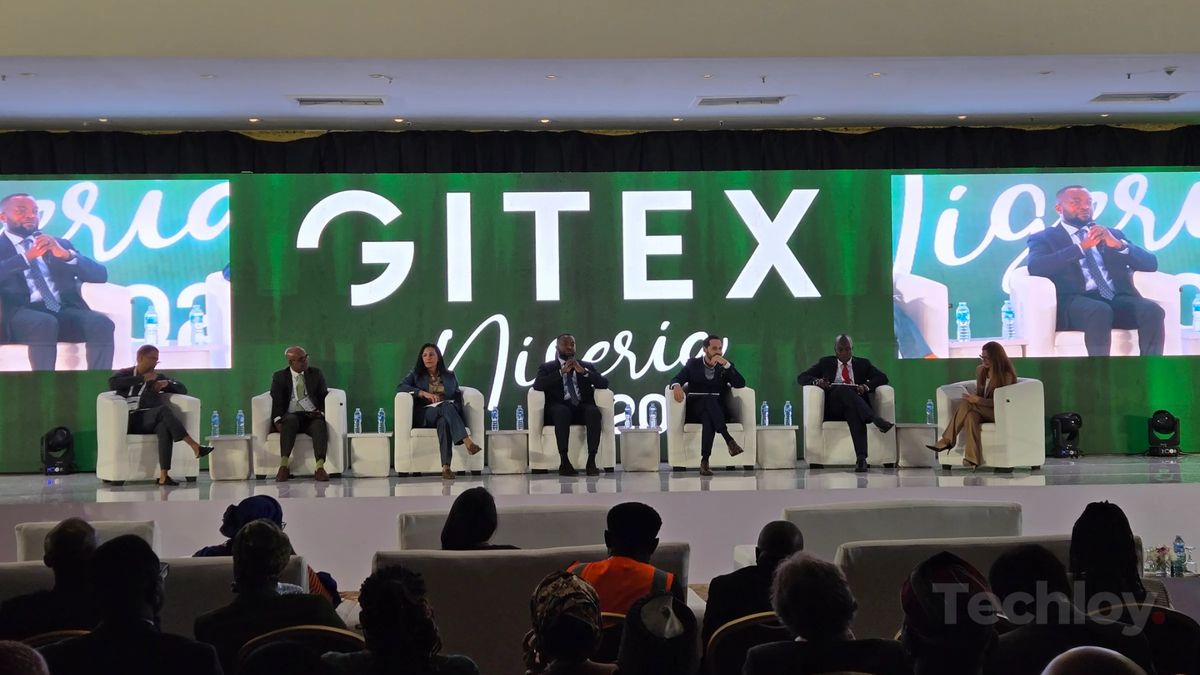
AMD and Nvidia Also Made an Appearance
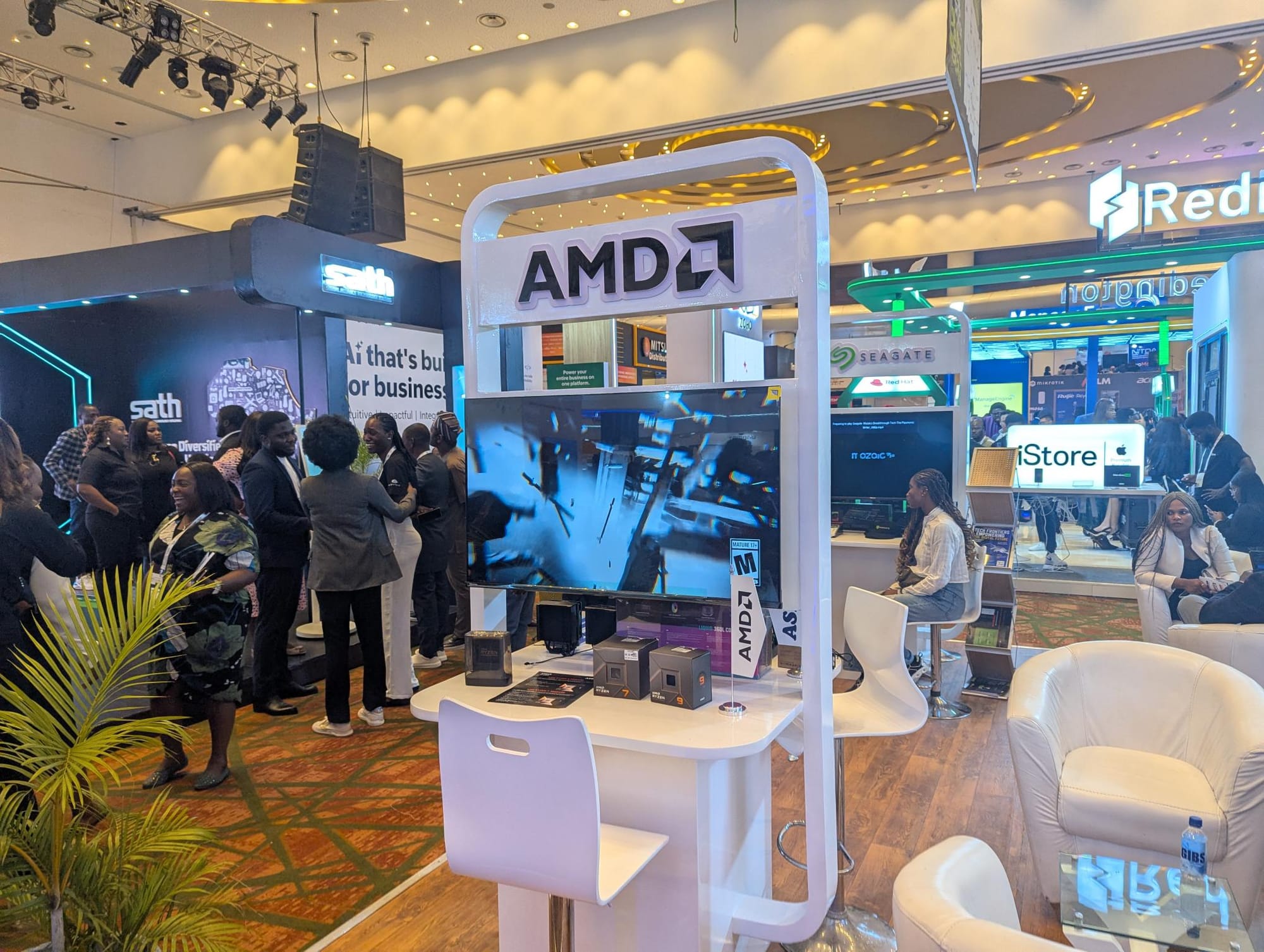
While cybersecurity and enterprise ICT providers dominated the floor, hardware giants had their share of presence too, particularly AMD.
AMD had two layers of presence at Gitex Nigeria 2025. On one hand, their distributor XFX was there, actively seeking local partners to help them expand into the Nigerian market. Already well-established in North Africa, XFX showcased AMD’s 7000 series GPUs for gaming alongside the brand-new Radeon AI Pro R9700, built for AI inference and heavy enterprise workloads. I was able to see and touch both products, which made their capabilities feel much more tangible.
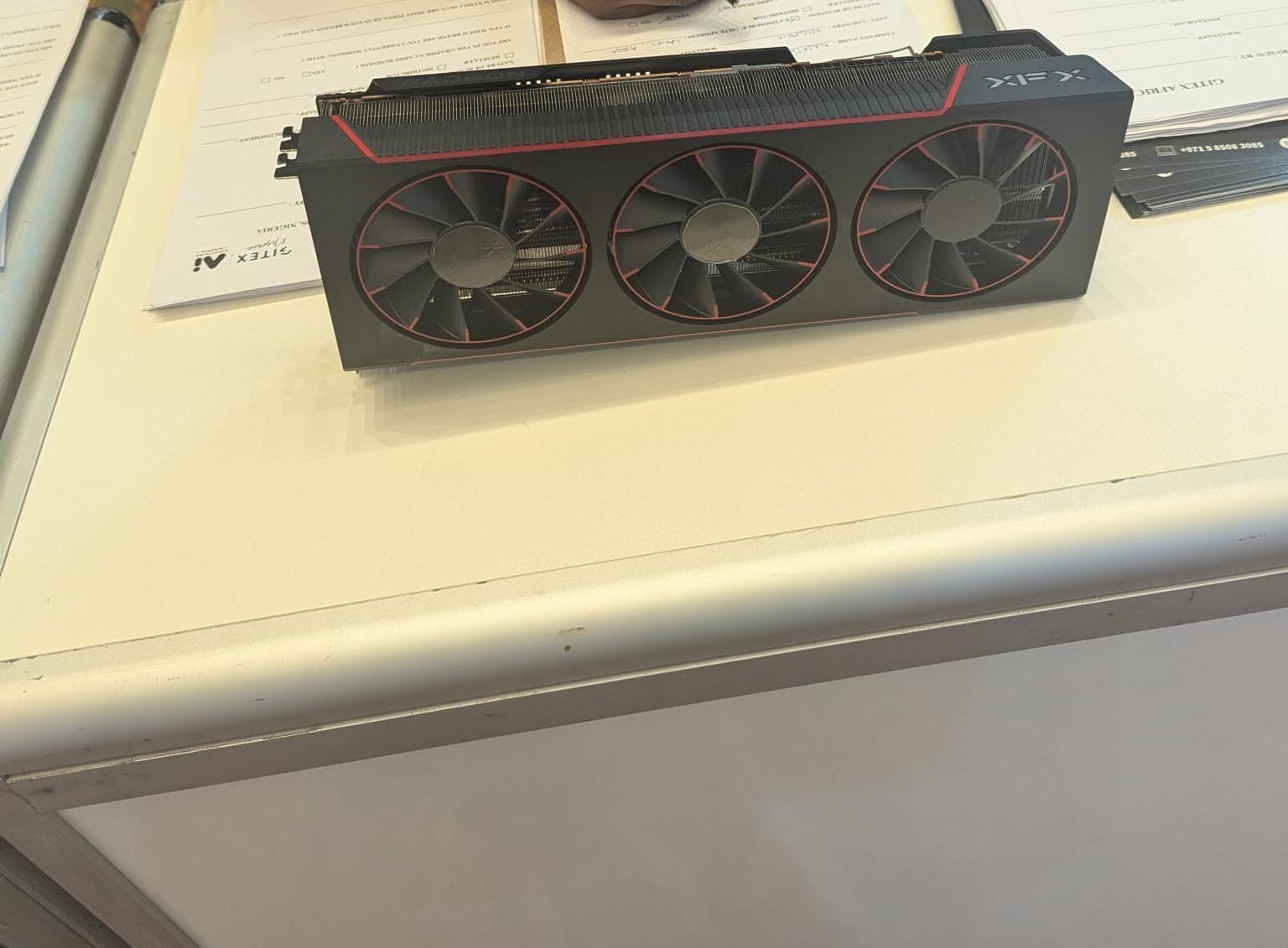
Speaking to Techloy, the XFX team explained that they do not sell directly to customers, as their model is based on bulk sales, and emphasized why partnerships are critical if they want to establish a foothold in this market. When asked about challenges in Nigeria, a representative pointed to purchasing power as their biggest obstacle. With the economy under strain and many consumers prioritizing basic needs over investing in high-end PCs or GPUs, demand remains limited. Still, he noted that enterprises and specialized sectors show promise.
Beyond XFX, AMD itself had a dedicated booth at the expo. This time, the focus shifted to the AMD Ryzen 9 series CPUs. Unlike the GPUs that leaned toward gaming and AI workloads, the Ryzen 9 lineup was positioned as a performance workhorse for power users and professionals. Seeing AMD directly present, alongside their distributor, reinforced the sense that they are serious about planting deeper roots in the Nigerian and wider African market.
On the Nvidia side, the story was different. They had a booth, but their display felt dated. The only hardware available to check out was the GeForce RTX 4090 GPU, a card that originally launched back in 2022. While the 4090 is still an impressive piece of tech, the absence of Nvidia’s more recent offerings stood out, especially compared to AMD’s push with their newest products.
MTN Bets on Fibre and Data Centres
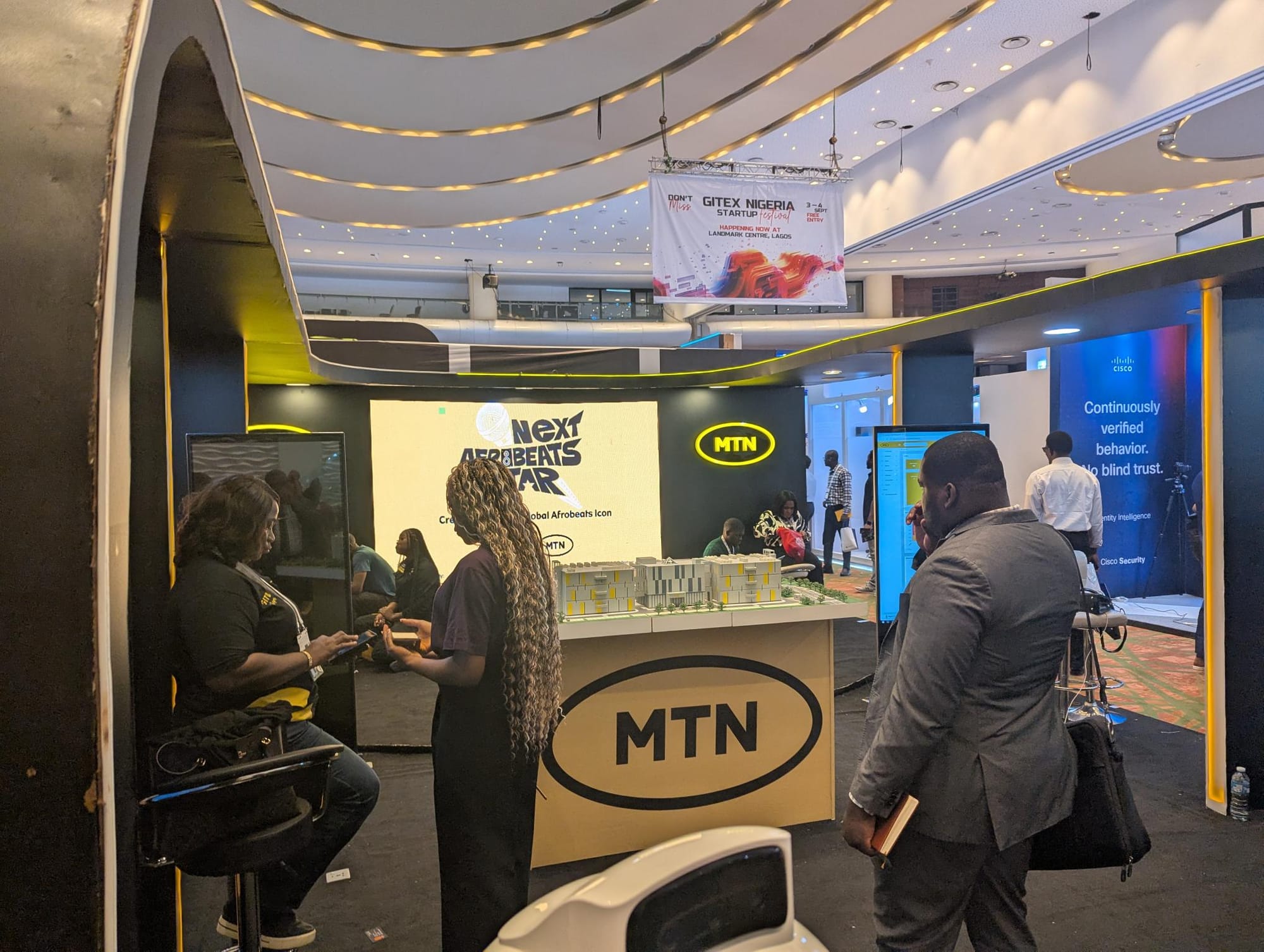
Another major participant at Gitex Nigeria 2025 was MTN, and their booth was impossible to miss. Their booth featured a striking model of their new data centre in Ikeja, launched just eight weeks ago. Speaking to their representatives, the data centre is meant to provide scalable, secure, and locally hosted digital services for enterprises, reducing dependency on infrastructure outside the country.
A Model of MTN’s New Data Centre | Video Credit: Oluwaseun Bamisile/Techloy.com
Alongside this, MTN was actively promoting FibreX, a high-speed fibre internet service designed to deliver faster and more reliable connectivity for homes and businesses. FibreX is part of MTN’s broader push to strengthen Nigeria’s digital infrastructure and meet the growing demand for stable, high-bandwidth internet.
Together, these two moves signaled a major strategic shift: MTN is no longer just a consumer telecom operator. It is positioning itself as a central pillar in Nigeria’s digital infrastructure and is pushing deeper into enterprise solutions and digital infrastructure to anchor Nigeria’s digital transformation.
Robotics Steal a Glance of the Future
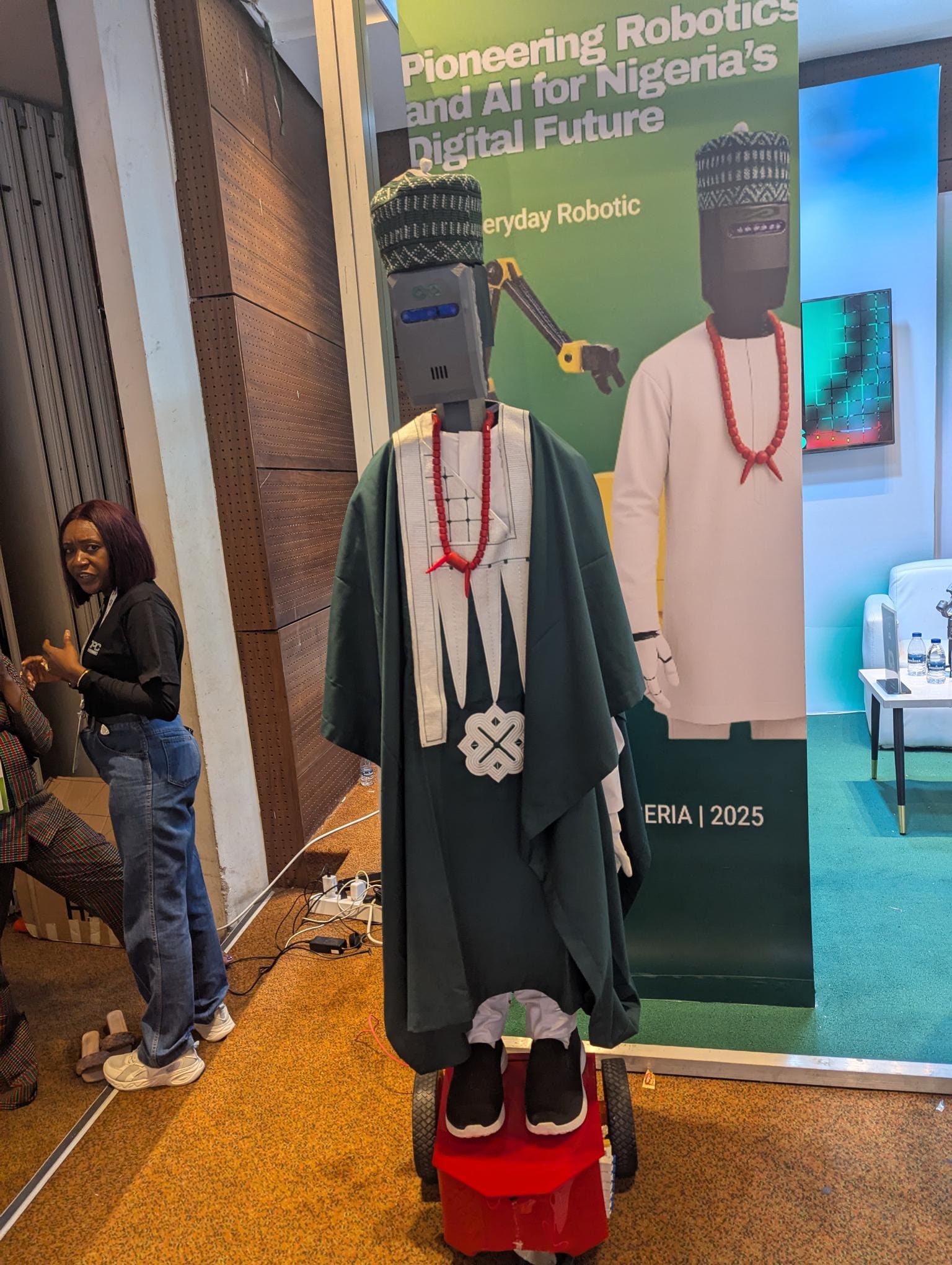
Gitex Nigeria 2025 was not just about cybersecurity, ICT, or big hardware brands. Robotics made an appearance, too. At the booth for the Nigeria Institute for Policy and Strategic Studies (NIPSS), two robot prototypes stopped visitors in their tracks.
The first was Hope, a humanoid robot designed to interact naturally with people. According to the representative, Hope can talk, recognise faces, move independently, assist with tasks, and even retain memory. Its design seemed aimed at service and assistance roles, possibly for environments like hospitals, schools, or offices.

The second prototype, Help Buddy, looked very different. Shaped more like an excavator, it had functional claws that could move around and pick up objects. While less humanoid, it was clearly built for practical, heavy-duty assistance.
Neither robot was fully operational at the event, but the NIPSS representative explained that these were early prototypes, with plans to refine and eventually mass-produce them if testing proves successful. Even in their incomplete state, they represented an exciting glimpse into how Nigeria is experimenting with robotics and automation for the future.
Nigerian-made Laptops from Zinox
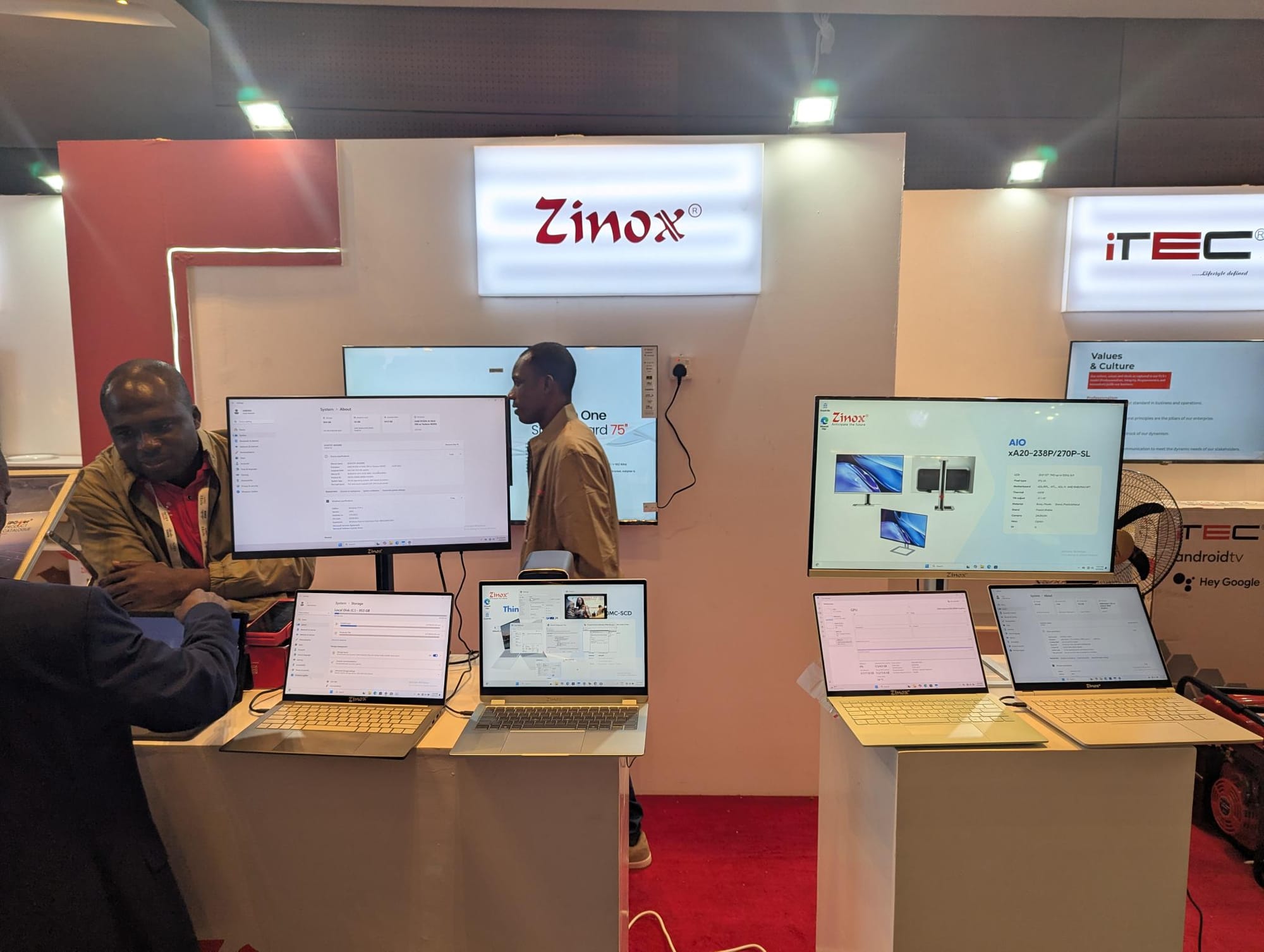
Upstairs, a booth lined with laptops carrying the Zinox branding caught attention. While not a new company, Zinox has struggled with visibility, something their representatives admitted they are working to change.
Still, the idea of a Nigerian company assembling laptops locally is impressive. In an event dominated by international tech giants, Zinox’s presence stood out as a reminder that Nigeria has the potential to develop and grow its own hardware ecosystem.
Retinaad and Meetbox
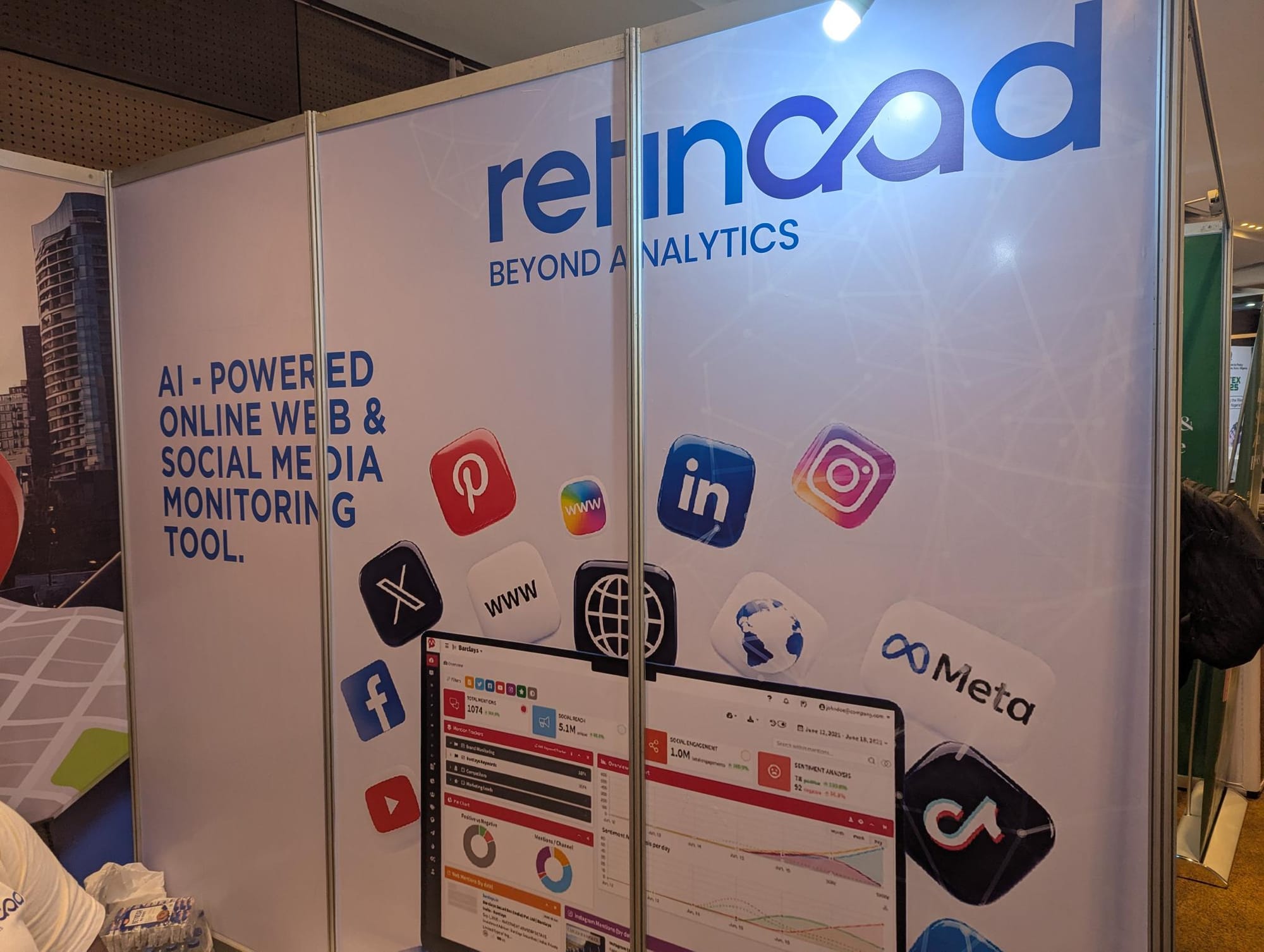
In between the bigger names, smaller startups also added their voices to the mix with some interesting niche companies like Retinaad and Meetbox.
At the Retinaad booth, the company showcased its AI-powered online web and social media monitoring platform. The tool enables companies and advertisers to go beyond assumptions by providing them with clear insights into the actual reach of their campaigns and their popularity across platforms like X, Meta, Google, and TikTok. It is essentially a data-driven way for brands to measure visibility and engagement, making marketing decisions less of a guessing game.
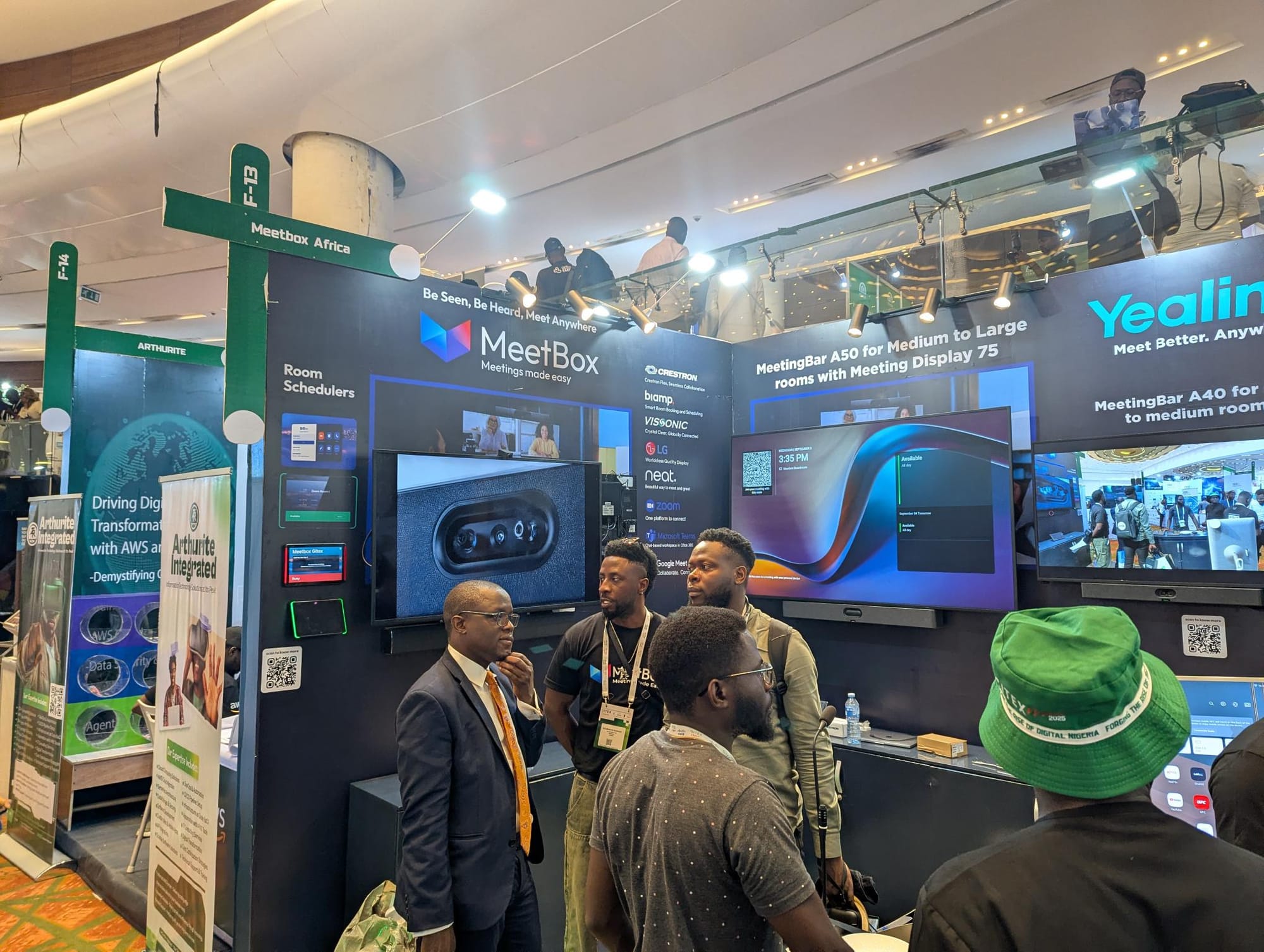
Meetbox, meanwhile, drew attention with a robot dog stationed at their booth — though the real story was their smart video-conferencing system designed with intelligent features like auto tracking, audio and video fencing, and participant framing.
Beyond software, they also provide video-conferencing hardware, backed by exclusive distributorship deals with major global manufacturers such as Yealink, Poly, Logitech, and Neat. They claim their system integrates with popular conferencing apps, such as Microsoft Teams, Zoom, and Google Meet, making it a one-stop solution for both hardware and smart conferencing features.
Conclusion
In the end, GITEX Nigeria 2025 Tech Expo at Eko Hotel wasn’t about flashy consumer gadgets or one-off product launches — it was about the backbone of Africa’s digital future. Cybersecurity, enterprise ICT, cloud, data centres, and infrastructure took centre stage, reflecting where the real energy and investment are flowing right now.
It felt less like a tech fair for everyday buyers and more like a gathering of builders, the companies, startups, and innovators laying down the foundations for Nigeria’s digital economy. The conversations focused on solving problems, navigating regulations, and exploring how digital technology can align with the realities of African markets.
The takeaway was unmistakable. At Eko Hotel, the event showed that while consumer demand may be limited by economic realities, enterprises are pressing ahead, investing in security, connectivity, and innovation. GITEX Nigeria 2025 was ultimately a showcase of how global and local players alike are positioning themselves to power the region’s digital transformation.
GITEX Nigeria 2025: What Do Africa’s VCs Really Want in 2025?
Top investors made it clear that unit economics, blended capital, and local solutions, not hype, will define the next chapter of African venture.
